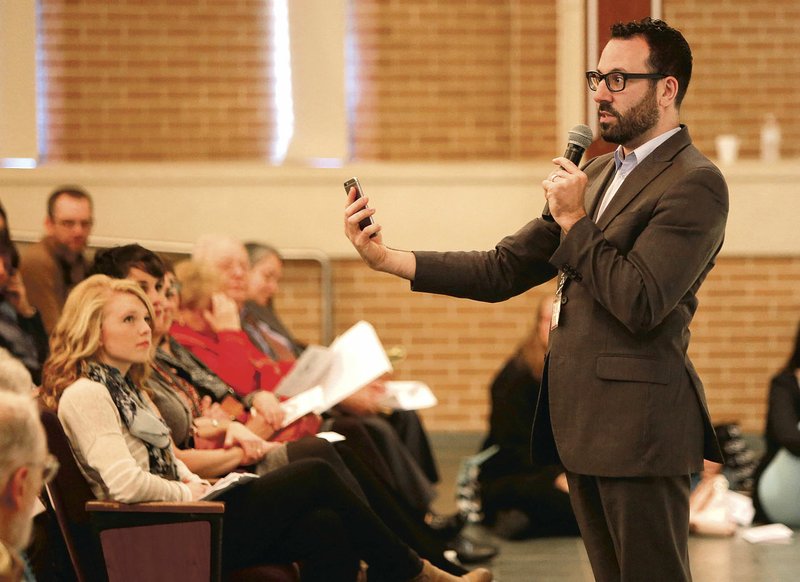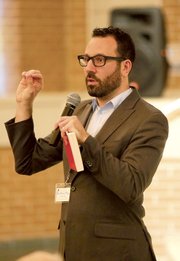"Let's start with a dilemma," said Danny M. Cohen, with the hard "i" reflecting his British upbringing.
"Imagine you are a writer or a storyteller. You write fictional stories, or maybe a blog. If you were a writer, how would you conclude this scene?"
Unsilence Project
Danny M. Cohen started the Unsilence Project to guide educators to help young students ask critical questions about hidden stories of atrocities, marginalized peoples, human rights and social justice. His fiction, readers guides and other instructional resources are available on the website:
First they came for the Socialists, and I did not speak out —
Because I was not a Socialist.
Then they came for the Trade Unionists, and I did not speak out —
Because I was not a Trade Unionist.
Then they came for the Jews, and I did not speak out —
Because I was not a Jew.
Then they came for me — and there was no one left to speak for me.
— Martin Niemoller (1892 to 1984)
Niemoller was prominent Protestant pastor who emerged as an outspoken public foe of Adolf Hitler and spent the last seven years of Nazi rule in concentration camps.
Source: United States Holocaust Memorial Museum
Niemöller is perhaps best remembered for the quotation:
Then Cohen related a scene from his book Train, released in January:
In February 1943, in Berlin, it's cold, and Elise puts on a heavy coat when it's time to leave school and go home, he begins. But what is she wearing under that coat? She holds it tight. She goes to the market to get groceries and hears someone shout in an alley. She sees two teen boys fighting. Then she sees one boy pull a knife, but she's frozen. She can't stop watching.
At Cohen's request, Northwest Arkansas students sitting in the chapel at the Jones Center in Springdale turned to each other and shared their ideas of how the scene could have ended, what other actions Elise could have taken, what other roles she could have played.
Students' options included stepping up to help the victim; walking away, saying, "Not my problem;" or turning around and letting the knife-wielder chase her instead of the younger boy.
"Of course, in 2015, we would ..." Cohen pulled out his cell phone and held it in front of him.
"We would record it," he said. [But] "the phone issue is a complicated one," he continued. "Sometimes it stops us from intervening, but it also allows us to be witnesses and record the action. Then our video becomes evidence, and when it goes viral and shows what happened, it can become a call to action."
Cohen spoke to students and teachers Nov. 6 at the 24th annual Holocaust Conference presented by the Arkansas Holocaust Education Committee at the Jones Center. He also spoke about his writing Nov. 5 in another session of the conference at the University of Arkansas.
Cohen serves as assistant professor of instruction at Northwestern University's School of Education and Social Policy and The Crown Family Center for Jewish and Israel Studies. "He teaches about the design of Holocaust education, Holocaust fiction and marginalized narratives of human rights," reads Cohen's author profile in Train.
He is the grandson of Maurice Ziekenoppasser, a Jewish survivor of Nazi-occupied Amsterdam. Cohen's middle name comes from his grandfather.
ADDING TO CONFUSION
Cohen described himself as a learning scientist. "It's a new field. I study how people learn."
His specialty is studying how people learn about prejudice, atrocity and human rights, he said. He calls his writing "human rights fiction."
"I am the grandson of an Auschwitz survivor, but I did not know the Nazis tortured and murdered thousands of people who weren't Jewish in Germany and Austria," Cohen introduced himself.
"Historically, the first to go were political opponents," he said. "I assume that's a given in any society. The Nazis sterilized and murdered many others before the Jews."
In alphabetical order, he listed Africans, alcoholics, Asians, dissenting clergy (especially Catholics and Lutherans), criminals, social dissidents, the disabled,homeless, immigrants, intellectuals, Jehovah's Witnesses, lesbians, pacifists, protectors, Romas, those of Slavik descent, Soviet prisoners ...
But the persecution didn't stop with the Nazis or with the war, Cohen pointed out during his UA presentation.
During the Liberation, British and American lawyers determined homosexuals could not receive war reparations because homosexuality was against the law, Cohen said. The Roma people (often referred to as gypsies) were denied reparations for their suffering and loss of homes until 1982, he added, and those people have been excluded from most textbooks, ceremonies, films and novels about the Holocaust.
As a teacher, Cohen noted he could never find any stories to connect with the black-and-white images of the era. The collective memory of the Holocaust fades as the survivors succumb to age.
"So what makes us remember? What makes us care?" he asked. "Do you remember when you first heard about the Holocaust? Do you remember when you were first interested?
"Histories are made up of stories -- whole stories that are engaging, thrilling, intriguing," he told educators.
"If we don't hear the stories, they are marginalized," said Jennifer Hoyer, associate professor of German at the University of Arkansas and head of the school's new Jewish studies program.
Teachers use individual stories found in film and fiction to humanize history, Cohen continued. "They are a compelling entry point. But which stories do we tell?"
The problem of Holocaust education began with survivors telling their stories, Cohen said. "They were the exclusive focus -- victims and survivors. But there were other sides, too.
"And we must teach about different forms of prejudice -- we can't teach just one. And we must show the stories are connected.
"Members of persecuted communities also had prejudice [toward] other persecuted communities," Cohen noted. "Even victims would target others, and often, instigators acted on their own prejudice.
"What confuses you? What are you struggling to figure out?" Cohen asked teachers. "As I teacher, I want to ask questions to get me excited -- that's how to get others excited. If I ask questions I already know the answer to, I'm boring.
"How did ordinary people become murderers?" he asked. "Didn't anyone take a stand against the Nazi regime? Why did people turn blindly against neighbors?"
"This is why we tell the Holocaust stories," said Tad Sours, a faculty member at Haas Hall Academy in Fayetteville. "This is why we need to show the horrors that were inflicted by Europeans on Europeans, by human beings on fellow human beings."
"These are the confusing, puzzling, complex stories that make us think," Cohen said. "The 'why' questions matter. That's the purpose of Holocaust education."
IT'S COMPLICATED
Through his research, Cohen has read many diaries, journals and stories of people living in Europe during the time of German occupation and the Holocaust. He feels these stories must be told, to fill the gaps in our memories, thus he calls his writing "accidental holocaust fiction."
Cohen's short stories and his first novel, Train, stand as works of fiction, but that fiction has a historical emphasis, he said.
"I was inspired by the real story," Cohen said. "In the book, if an event happened in public, it actually happened! Whatever is happening that minute, it happened in history."
For example, on March 2, 1943, the Germans arrested Jews and took them to a detention camp in an abandoned building in Berlin -- much of the setting of his story, he said. And early in 1943, at the Battle of Stalingrad, Germans surrendered control of Stalingrad to the Soviet Union.
Speaking again of Elise, Cohen told students that Elise ran from the scene of the boys fighting.
"But don't be too quick to judge bystanders," he said. "Being a bystander is really complicated. We don't know choices spinning around in their head before something goes badly wrong."
Cohen continued the story of Elise:
"When she gets home and takes off her coat ... What's under it?" he asked. Most guessed a yellow star, which the Germans required all Jews to wear visibly on their clothes.
"It was a Nazi Girls League uniform," Cohen revealed Elise's secret. "It was a part of the Nazi Youth. By law, all German Christian children had to be a member."
Elise's father is a German soldier, fighting at Stalingrad but listed as missing in action, he continued. Her mother is a "vehement anti-Semite" and hates the Roma. She could be called a Nazi sympathizer, Cohen said.
But before Elise's father went to fight, he discovered her younger brother did not die of typhus in the hospital, as the family had been told. The boy had been murdered by Nazi doctors because of his developmental disability.
"Where does that place Elise and her family in history," Cohen asked. "Were they perpetrators? Were they victims? Or were they both? Or something else?"
In a need for simplification, humans are taught to create categories. "We must complicate the categories," Cohen said. "Complication humanizes the stories. We must make sure history is not perceived in black and white."
Cohen said he purposely wrote no ending to his book. "You can go into history to find similarities" -- and, he added, you can see them in the modern world, which is again becoming stratified.
"The Jews cry 'Never again!' but they can't say that," Cohen said. "Just watch TV, and you'll see Syria, Darfur, ISIS, ... You'd think that in 2015 -- 70 years after the end of the Holocaust -- communities could help each other and stand together."
NAN Our Town on 11/19/2015


